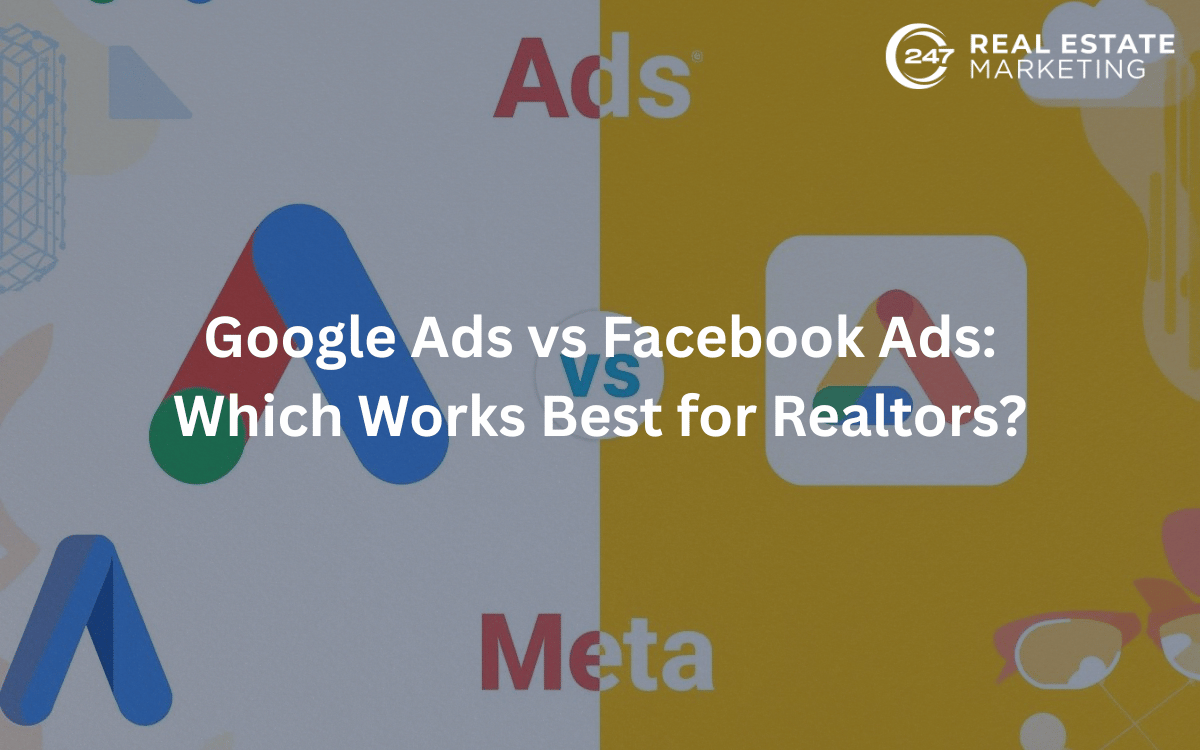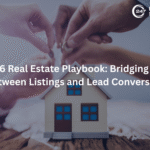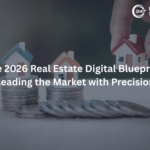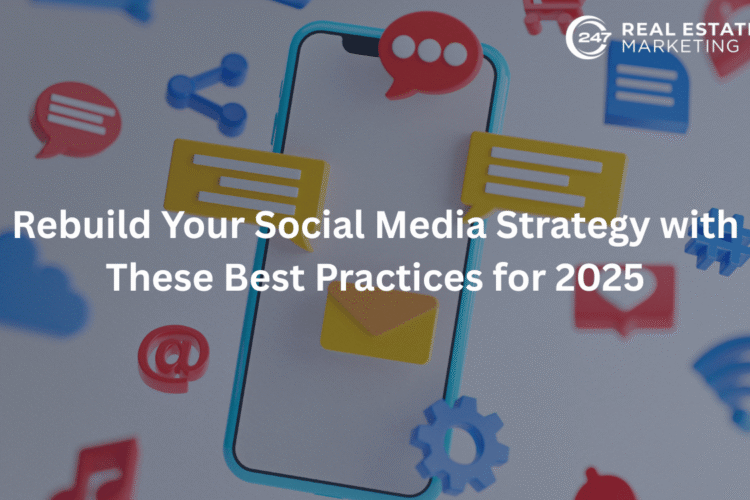
Digital advertising isn’t optional anymore it’s the engine behind modern real estate prospecting. With most buying journeys starting on search engines, and social platforms hosting billions of active users, smart ad strategies put your listings and brand in front of high‑intent buyers and sellers exactly when they’re researching or scrolling.
What Are Google Ads & Facebook (Meta) Ads and How Do Realtors Use Them?
Google Ads (Search, Performance Max, Demand Gen)
Google Ads lets you place pay‑per‑click (PPC) ads across Search, YouTube, Maps, Discover, Gmail, and more. For real estate, search campaigns capture high intent queries like “homes for sale near me,” while Performance Max uses Google’s AI to find conversions across channels (great for lead forms, calls, and site visits). In 2025, Google added more controls and transparency campaign‑level negative keywords, demographic/device exclusions, and deeper Performance Max reporting making it easier to steer AI toward quality real estate leads.
Facebook/Instagram Ads (Meta)
Meta’s ecosystem (Facebook + Instagram) excels at audience discovery and nurturing. Realtors use Engagement, Traffic, and Lead objectives to run carousel/video ads showcasing listings, client stories, or neighborhood guides. Meta’s Advantage+ suite now automates targeting and creative at scale, and recent updates added video catalog ads, promo codes, and lead‑quality safeguards (verification, CRM integrations) handy for real estate lead generation.
Targeting & Compliance: What Realtors Must Know
- Special Ad Category (Housing) on Meta restricts age, gender, ZIP code targeting, limits detailed interests and replaces lookalikes with Special Ad Audiences designed to prevent discrimination in housing ads.
- Google’s Personalized Ads Policy similarly limits housing (and credit/employment) targeting by age, gender, parental status, marital status, and ZIP code; recent enforcement strengthened consumer finance rules in 2024.
Implication for realtors: You’ll rely more on contextual signals (keyword intent, in‑market audiences), creative messaging, and first‑party data (site visitors, CRM lists with policy‑compliant use) than on demographic filters.
Cost‑Effectiveness, Lead Quality & ROI Side by Side
Cost‑Effectiveness
- Google Ads: Across industries in 2024, CPC rose while CTR improved; real estate was among sectors with >25% CPC increases YoY so controlling irrelevant queries matters.
- Facebook Ads: Lead campaigns showed relatively stable costs, with many advertisers seeing improved conversion rates and lower CPLs versus search in several sectors (context varies by market).
Concrete real estate benchmarks:
- LocaliQ data shows search CPLs for real estate subcategories typically under $100 per lead (e.g., Apartments $35.52; Residential Agent $75.94) these are generated from ad clicks that resulted in contact.
- A broader multi‑industry study found average paid CPL for Real Estate at $480, underscoring how lead quality, market, and channel mix can swing costs widely.
- On Meta, a large dataset reported real estate Facebook lead CPL averaging $27 globally across 2024–2025, with seasonal volatility (low $17–high $41).
Lead Quality
- Google leads are often higher intent (people actively searching homes or agents), which tends to yield better appointment set rates and downstream ROI especially when you align keywords and landing pages to local inventory and capture forms. (Trend: performance‑friendly SERPs and broad‑match expansion increased clicks, so precision controls are vital.)
- Facebook leads can be lower intent but plentiful, ideal for top/mid‑funnel nurturing think email/SMS sequences, market reports, and listing alerts to mature prospects into clients. Advantage+ lead tools (verification, automated chats) help filter out spam and improve quality.
ROI
- Search ads remain critical because the majority of buying journeys begin on search engines, translating to strong conversion potential when tracking is set up correctly.
- Social ads provide cost‑efficient reach and retargeting that lifts conversion rates of your entire funnel especially when combined with video tours, Reels‑friendly formats, and creator partnerships.
Recent Updates & Trends Realtors Should Act On
Google Ads: More Control in AI‑Powered Campaigns
- Performance Max now supports campaign‑level negatives, brand and demographic exclusions, device targeting, search terms insights, and channel‑level reporting giving real estate marketers clearer levers to reduce irrelevant traffic and attribute across Search/YouTube/Maps.
- AI Max for Search expands reach with broad match and “keyword less” tech while preserving controls useful for discovering new high‑intent queries like neighborhood + price band combos.
Meta Ads: Advantage+ & Lead Generation Enhancements
- Advantage+ creative optimizations auto‑fit videos to Reels and mobile (9:16), catalog ads support branded/product videos, and promo codes lowered cost per purchase by ~9% in tests great for launching limited‑time campaigns (e.g., closing cost incentives).
- Lead generation got smarter with verification, CRM integrations, and AI‑driven Advantage+ leads campaigns helpful to keep contact quality high for agents and teams.
Privacy & Targeting Compliance
- Expect ongoing enforcement of Housing Special Ad Category restrictions on Meta and Personalized Ads policy on Google set campaigns correctly to avoid delivery issues or rejections.
3 Credible Stats Realtors Can Use in Planning
- 80%+ of buying journeys begin on search engines proof that search visibility (and Google Ads) matters for discovery and conversions.
- Real estate CPCs increased >25% YoY in 2024 benchmarks, highlighting the need for tight query control and landing page relevance to protect budgets.
- Facebook real estate lead CPL averaged ~$27 across a $3B dataset (Nov 2024–Oct 2025) but swung between $17–$41 month to month budget pacing and seasonality are key.
(Bonus) Industry data indicates real estate search CPLs often under $100 in many local categories when campaigns are well‑structured set this as a realistic target and optimize weekly.
Which Platform Works Best for Different Realtor Goals?
- Need high‑intent buyers/sellers now?
Choose Google Ads (Search + Performance Max). Build tightly themed ad groups around neighborhoods, price ranges, property types, and “near me” queries. Use conversion tracking and call extensions and apply campaign‑level negatives to cut irrelevant traffic. (If you work with a Real Estate PPC Agency, ask for weekly search term reviews and landing page A/B tests.) - Want to build pipelines, brand, and nurture?
Choose Facebook/Instagram. Run video tours, carousel listings, and market‑update creatives with Lead or Engagement objectives. Layer Advantage+ creative optimizations and lead‑quality checks, then nurture via email/SMS and retargeting. (Ideally when your Social Media Marketing for Real Estate aims to grow audiences and stay top‑of‑mind.) - Team strategy:
Use both. Feed your funnel with Meta (low‑cost reach + lead volume), then capture high‑intent conversions with Google. Share first‑party audiences across platforms (in policy‑compliant ways) and coordinate messaging new listings, open houses, price drops, and neighborhood guides.
Practical Tips (Checklist)
- Google Ads
- Map keywords to specific landing pages (neighborhood, property type) to boost Quality Score and lower CPC.
- Use Performance Max, new customer goals and channel reports to prioritize fresh demand.
- Protect budget with negative keywords and brand exclusions.
- Meta Ads
- Turn on Advantage+ creative optimizations for vertical video placements; add video to catalog ads.
- Implement lead verification and CRM sync to improve lead quality and speed to response.
- Declare Housing Special Ad Category and keep targeting within rules.
Conclusion: A Balanced Approach Wins
If your goal is immediate, high‑intent leads, Google Ads typically delivers better lead quality and ROI, especially when campaigns are structured around neighborhoods and intent, and you leverage the newest Performance Max controls.
If your goal is brand building, reach, and list growth, Facebook/Instagram shines with cost‑effective lead volume and storytelling formats (Reels, carousels, videos) now enhanced by Advantage+ automation and lead tools. These updates reflect a major Digital Trend in real estate marketing: using AI‑driven creative optimization and social engagement to build trust and visibility.
For most realtors, the smartest play is hybrid: running search to capture demand and social to create it. If you prefer to outsource execution, look for the Best Real Estate Digital Marketing Services or partner with a specialized Real Estate PPC Agency to keep creatives fresh, tracking accurate, and budgets optimized across platforms.





